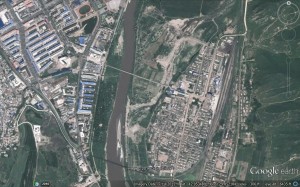In September 2013 the DPRK held its first conference on economic development zones under the just announced State Economic Development Commission. Read all about it here.
On May 2, 2014, KCNA announced a second conference:
Knowledge Sharing on SEZs in DPRK Held
Pyongyang, May 2 (KCNA) — There took place at Yanggakdo International Hotel on Friday knowledge sharing on SEZs in the DPRK hosted by the Korea Economic Development Association [AKA State Economic Development Commission/Association].
It was attended by Ri Chol Sok, vice-chairman of the association, and its other officials and experts and teachers and researchers at scientific and educational institutions and officials concerned.
Also present there were Kyung-Ae Park, professor at University of British Columbia, Canada, prestigious experts on special economic zones from China, India, Canada, Philippines and the U.S. and foreign diplomatic envoys and representatives of international bodies here and foreign embassy officials.
Ri Chol Sok and Kyung-Ae Park made speeches.
The speakers congratulated those participants on the successful holding of the event and mentioned the importance of the exchange of each other’s experience and cooperation in developing special economic zones and managing and operating them.
They said that the event would help to broaden experts’ vision and expand the development work and also contribute to promoting the international exchange and cooperation.
Then followed speeches.
Introduced at the event were the present situation in some economic development zones of the DPRK and their prospect and policies of preferential treatment and the master plan for Wonsan-Kumgangsan area.
The results of researches and opinions were exchanged and the BOT widely applied to investment and cooperation and the experience gained by various countries in doing so were discussed.
The event marked an occasion in contributing to turning economic development zones of the DPRK into world-level economic cooperation zones by introducing the advanced experience gained in special economic zones according to the specific conditions of the country.
Uriminzokkiri posted this video of Kyung-Ae Park and Yun Yong-sok:
Here is a loose translation of the video:
Q) What were your initial thoughts on the SEZ’s?
A) It is important to differentiate the North’s SEZ’s from those of other countries to make them attractive to investors. For tourism SEZ’s, many experts have recommended minimizing environmental degradation to promote sustainability. 신평 관광개발구 (신평 tourism SEZ) is a good example where sustainable development can help attract tourists who wish to relax and enjoy the environment.Q) You teach Poli Sci at UBC, how did you get interested in SEZ’s?
A) Faculty exchanges among economics and management experts are often more profitable than academic discussions on political science. Naturally, those who participated in the exchange programs were talking about SEZ’s more often than any other topics.Q) What are your thoughts on the prospects of the North’s SEZ’s ?
A) I was impressed how the entire country is putting an effort into SEZ projects. This is a very positive aspect, but we need to think about making these SEZ’s more attractive than SEZ’s of other countries.
Here is another translation:
Dr. Park: The key issue of establishing economic development zones (EDZs) is how to make ‘our’ zones distinctive from other countries. In the tourism industry, for example, it has been suggested that simply constructing new buildings, hotels, and condominiums does not offer any competitive advantage because others have been doing the same way. Instead, a better way is to ask ourselves what makes our zones unique so that they could attract people and investment. For North Korea, it is indeed the beauty of the wilderness and untouched nature that makes the country remarkable.
While teaching political science in University of British Columbia, I’ve come to realize that the South-North exchange should first take place in the area where both have mutual interests and the outcome can be mutually beneficial. Exchanges among the political scientists will unlikely be productive; so instead, we have been inviting numerous North Korean professors of economics and business, including those from Kim Il-Sung University, Wonsan University of Economics, and Pyongyang University of Foreign Studies. And this year we are extending our invitation for the fourth time.
Yet, compared to the number of North Korean experts coming to Canada, not many scholars have visited the North from our end as part of an exchange program. While we were considering ways to facilitate an academic exchange at a greater level, we were lucky to get in touch with Korea Economic Development Association (KEDA; aka Chosun Economic Development Committee). We had a meeting on special economic zones last October […] and this was a follow-up meeting after the successful outcome of the first one. Canada-DPRK Knowledge Partnership Program (KPP) organized the event, and KEDA co-hosted the meeting.
Many experts have suggested that more study is needed to make North Korean economic zones distinctive, unique, and attractive. The critical issue remains as to how to attract foreign capital and investment. Despite many challenges North Korea may confront, we believe that passion and diligence of North Koreans will prove fruitful.

